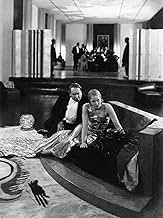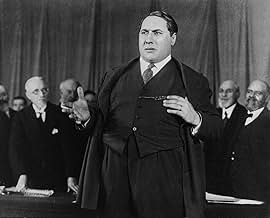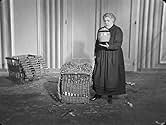Füge eine Handlung in deiner Sprache hinzuThe business tycoon Nicolas Saccard is nearly ruined by his rival Gunderman, when he tries to raise capital for his company. To push up the price of his stock, Saccard plans a publicity stun... Alles lesenThe business tycoon Nicolas Saccard is nearly ruined by his rival Gunderman, when he tries to raise capital for his company. To push up the price of his stock, Saccard plans a publicity stunt involving the aviator Jacques Hamelin flying across the Atlantic to Guyana and drilling ... Alles lesenThe business tycoon Nicolas Saccard is nearly ruined by his rival Gunderman, when he tries to raise capital for his company. To push up the price of his stock, Saccard plans a publicity stunt involving the aviator Jacques Hamelin flying across the Atlantic to Guyana and drilling for oil there, much to the dismay of Hamelin's wife Line. While Hamelin is away, Saccard t... Alles lesen
- Regie
- Drehbuch
- Hauptbesetzung
- Line Hamelin
- (as Mary Glory)
- Massias
- (as Al. Mihalesco)
- Daigremont
- (Nicht genannt)
Empfohlene Bewertungen
Pierre Alcover who plays Saccard, the treacherous financier who falls for the hapless heroine whose pilot lover has conveniently flown to Equatorial Guinea to drill for oil, is quite good, but Brigitte Helm, the comely object of his affections is just awful. She's the kind of actress who would overact when pretending to be asleep, and when she is on the brink of suicide she wanders into Saccard's office and stumbles around as if wounded by a sniper's bullet. Saccard looks like the manipulative weasel that he is. He fancies himself as a Napoleon of the financial world but, like Napoleon, he bites off more than he can chew when he locks horns with the urbane Gundermann.
The film does have some saving graces. L'Herbier's use of the camera is sublime, and gives the bored viewer something to concentrate on when the sluggish pace gets too much. Perhaps that is why he chose to film as a silent – the use of sound, while making the story easier to convey, would have restrained the camera and robbed the film of what vitality it possesses. The film does a good job of illustrating the corrupting influence of money, only over-emphasising its message on the rare occasion. As the character's become more depraved and self-absorbed their surroundings become more opulent, their clothes more refined, and it is clear that they are becoming prisoners of their possessions. There's also a great last scene – but you have to wait an unrealistically long time to get to it.
There is a match-cut from the engine of a plane to a madly spinning camera looking down from a ceiling that is perhaps the most impressive in the entire 30 years of cinema until then. And there is a lot of the camera choreographed to dance, or painting with our gaze incomplete motions across rooms.
Resnais would take all this thirty years later to revitalize French cinema.
Story-wise, it is about two puppet-masters vying for the control of the same world. The film begins on the level of the stage, the stockmarket, this new temple of the modern world devoted to capital, and pulls back to reveal who holds the strings, who re-invents the broadcasted reality.
Like Zen calligraphy, this is not about the painted signs on the scroll and what they mean, but the disciplined soul revealed by the flow of ink. Watch it like you would unfold a scroll, the ink is in the image.
The film, in the main is about money, of course, the two main characters are Saccard and Gunderman, two financiers. Gunderman is a remarkably well dressed prissy man who is a kind of financial magus, like a Rothschild. Saccard owns a bank but he's down the food chain. Gunderman is intent on persecuting Saccard, we're not totally sure why but Gunderman alludes that he likes financial stability and abhors the destabilising nature of financial speculation. If only Gunderman had been advising the US government in the last few years! However to an extent Gunderman is a bit of a hypocrite as he is using rash speculation to annihilate Saccard.
Saccard uses Hamelin, a dare-devil aviator, to restore confidence in his bank. He arranges a publicity stunt, making Hamelin co-vice-chairman of the board and having him fly off in a plane to break the non-stop solo transatlantic flight record. Once in Guyana, Hamelin is then to set up some oil rigs on land he has options on. The cash from this operation will then restore the fortunes of the Banque Universelle, whilst the publicity stunt will move emotional speculation in BU's favour.
It's a two and a half hour film so there is a lot of plot. What's good though is the way the plot is worked. There is an incredible amount of suspense in the movie, it's dragged out until you're left holding tufts of hair. The level of camera-work is also astonishing, when you watch films from this era you're used to pretty static camera. Well l'Herbier is going bonkers with his camera. He has a vertical camera over the top of the Bourse (Paris stock exchange) swinging about in delirium whilst Hamelin readies to fly away. It's like watching cellular bodies under the microscope, all the little bodies polarised around the nucleus of the central dealing table.
There is a swinging shot of a street crowd that made my jaw drop, and I had to rewind. I suppose the most effectual shot for me though was quite a simple one where he let Hamelin's plane fly of the side of the frame. This is cinematic heterodoxy from what I'm aware. Usually with a shot of a plane you will see it disappear as a dot in the distance or the shot will just cut to another. But you feel a sense of loss as the plane flies off, as it's all cut with shots of Hamelin's wife, you feel what she's feeling, with her husband disappearing off for a desperate maniac flight over the abyssal blue ocean.
L'Argent is also a very glamorous movie, some of the costume jewellery on display in this movie is tres chic! The Baronin Sandorf, a very well cast lady (Brigitte Helm) who really is a human cobra, plays a minor character with Vicar of Bray leanings. She wears a solid gold headpiece and matching earrings at a party that are almost unreal. There's also some costume jewellery that Saccard gives to Line, the wife of Hamelin, that widen the eyes.
As in the early study for this film L'Herbier's 1921 "Prométhée... banquier", we are shown a banker who literally can't get away from his desk, tied down by phone calls, totally unable to give a desperate woman important human news. The movie is, however, not a paroxysm of anti-capitalist rage, it's more of a gorgeous heady melodrama that tries to have it's cake and eat it. However it does lead one's thoughts in the right direction ultimately.
The one real fault I can find with the movie was the ending 10 minutes which were clumsy. It felt like L'Herbier didn't know how to end his film. The very very last scene saved the day a bit.
The tug of war between director and producer resulted in the latter excising thirty minutes from the film and not until its restoration half a century later were the lost scenes restored. Indeed it was not until the restoration that the film's acclaim finally matched its reputation and it has belatedly been acknowledged as one of the true masterpieces of silent cinema. As a bonus this same restoration has gifted us a highly charged score for piano composed and played by Jean-Francois Zygels.
The technical virtuosity of this film is simply stunning with the sweeping camerawork of Jules Kruger, low and high angle shots and Eisensteinian montage. L'Herbier's love of Art Deco is again evident in the magnificent sets designed by Lazare Meerson and André Barsacq. We are also treated to spectacular scenes in the Bourse, the fictitious World Bank, the Place de l'Opéra and the piéce de resistance, the financier Saccard's evening party.
L'Herbier has made sure that his film's immensity does not diminish the characters. This is surely Pierre Alcover's finest hour as Saccard, a monster of greed and rapacity who is also a pitiful creature. By arrangement with UFA the film also stars Brigitte Helm and Alfred Abel, both fresh from 'Metropolis'. Miss Helm as Baroness Sandorf has never been quite as sinuous and sensuous as she slithers around encased in Jacques Manuel's fabulous costumes. As she writhes on the sofa she epitomises the sheer carnality of wealth. The slight frame of Alfred Abel as Gunderman is in striking contrast to the corpulence of Alcover as his arch rival and his reptilian-like portrayal makes one think what a marvellous Professor Moriarty he would have made. As a contrast to the slinky Baroness we have the full-figured Marie Glory who is at her most appealing here in probably her finest role as Line Hamelin who is intoxicated by the lifestyle offered by Saccard's money but is not prepared to pay the price required. Dramatically effective is a rare appearance on film of Yvette Guilbert, former cabaret artiste immortalised by Toulouse-Lautrec, as a figure of Doom whose presence has always haunted Saccard and is there to witness his downfall.
This monumental piece is L'Herbier's greatest achievement and in his own words, 'the summit of my silent career'. No true cinéfile I am sure would disagree.
Wusstest du schon
- WissenswertesThere are 1,952 shots in the film, with an average shot length of just six and a half seconds.
- Alternative VersionenThe film was shown to the French press in December 1928 in a cut lasting about 3 hours and 20 minutes, however by the time the film had its first public screening in January 1929, producer Jean Sapene had ordered the length to be cut by half, unbeknownst to director Marcel L'Herbier and much to his and fellow filmmaker Marcel Carné's dismay. Much later, the film was restored to a running time of 2 hours and 25 minutes.
- VerbindungenFeatured in The Twentieth Century: The Movies Learn to Talk (1959)
Top-Auswahl
Details
- Erscheinungsdatum
- Herkunftsland
- Sprachen
- Auch bekannt als
- Das Geld
- Drehorte
- La Bourse, Paris 2, Paris, Frankreich(interior: shots from the ceiling covering the crowd movement of buying and selling orders)
- Produktionsfirmen
- Weitere beteiligte Unternehmen bei IMDbPro anzeigen
Box Office
- Budget
- 5.000.000 FRF (geschätzt)
- Laufzeit
- 3 Std. 15 Min.(195 min)
- Farbe
- Sound-Mix
- Seitenverhältnis
- 1.33 : 1

































